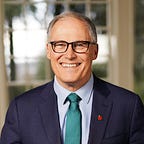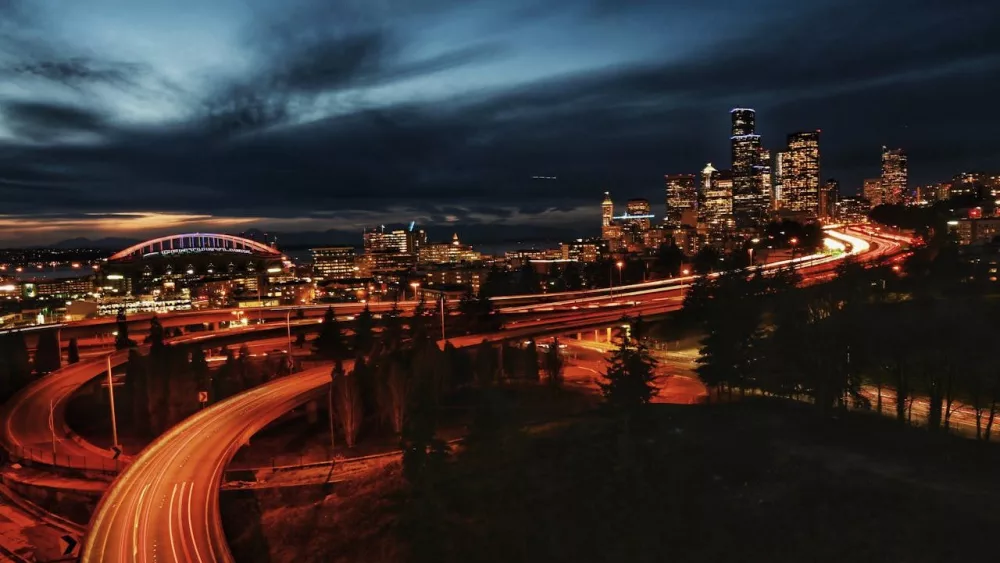On Tuesday, Gov. Jay Inslee delivered his 10th State of the State address, testifying to Washington state’s steady position as a top state for both business and workers, and its position as a beacon of progress on issues such as climate action, reproductive freedom, and more.
His remarks contained a promise to “run through the tape,” advice from his father, who served as a high school track coach, to envision the finish line beyond where it lies to finish at top speed.
In his final session, and his final year as governor, Inslee intends to do just that. He committed to continuing work with the Legislature to improve the state’s behavioral health system and homelessness response to help people who need it. He reiterated the urgency of fighting climate change and called for continuing the push for a constitutional amendment that would protect abortion rights in Washington state.
The following remarks were delivered at 12:00 p.m. on Tuesday, January 9, 2024. Inslee is currently the longest-serving governor in the country and is finishing his third term.

Good afternoon.
I would like to thank the Reverend Dee Eisenhauer for the invocation, and Bobby Ray and Shalah ‘Rose’ McCarthy for their wonderful voices.
Mr. President, Madam Speaker, Mr. Chief Justice, distinguished justices of the court, members of the Legislature, Tribal leaders, local leaders, members of the Consular Corps, and my fellow Washingtonians…
I come to you as a governor, as a granddad, and as a Washingtonian, to thank you and your families for your contributions to our efforts. My staff and their families deserve credit as well. Particularly my family and a very special person to me — Trudi.
I love seeing the childcare center she inspired us to build for our Capitol families, among many causes she’s advocated for as First Spouse. I love you Trudi and I’m not alone.
Let’s cut to the chase.
I’m happy to report we have been, we are, and we will always be the strongest state in the nation. In fact, the state of our state is stronger than ever. For over a decade, we’ve advanced nation-leading policies to support working families, grown our economy, and acted boldly to protect our state’s iconic spaces and salmon. We’ve advanced equity; built more housing; fought for a woman’s right to choose; and ushered in a clean energy economy.
In an era of tremendous transition and change, Washington has emerged as a beacon of progress in this nation. This year, we are going to make sure that light shines brighter.
This is my eleventh time addressing this chamber, and I have a bigger audience each year. There are 1 million more Washingtonians today than when I took office, because Washington is the place to be. I welcome our new Washingtonians who have seen the genius and promise of our state.
The minimum wage was $9 in 2013 and today it’s over $16. Wages overall have grown by 39% — double the national rate. Our GDP has grown 45%– from $528 billion in 2013 to $768 billion today. And we’re among the few states that rank as both a top state for business and for workers.
As we contemplate this next year and the work ahead, I think back to my dad, who coached track at Sealth High School.
He told his runners to imagine the finish line was 10 yards beyond the finish line. My father always said, and this is what sticks with me, “Fellas, run through the tape!” so they wouldn’t let up before the race was over.
We are going to run through the tape this year. Just as I know you’ll give this state your best work, I’ll give mine.
This is not a farewell speech. These are not famous last words. I’m not riding into the sunset. Winston Churchill said, “This is not time for ease and comfort. It is time to dare and endure.”
We will not relent to our greatest challenges. We will not go backward. This is the Evergreen State and the Ever Forward State.
And we’re going ever forward on our evergreen agenda. Climate change is our present, but climate collapse does not have to be inevitable. This Legislature put us on a clear — and necessary — path to slash greenhouse gases 95% by 2050.
We will stay the course.
Any delay would be a betrayal of our children’s future.
We are on the razor’s edge between promise and peril.
We know this when historic floods gut homes that stood for generations, or when wildfires force the evacuation of entire towns like Medical Lake last year.
And the need for climate action is felt daily for Washingtonians living with pollution.
There are neighborhoods today in Washington where people are dying two and a half years younger on average because of pollution.
This pollution is harmful to the lives of Washingtonians in communities like Everett, Wenatchee, Mattawa, Spokane, the Tri-Cities, the Yakima Valley, Shoreline, South King County, and Tacoma. There are neighborhoods in these communities where people are forced to live sicker and die younger because of this pollution.
We have made a solemn oath to our children, and their children, and in that noble mission we will neither flag nor fail. We will go on to give them the grandest of blessings, a healthy Washington, instead of taking rank with defeatists who live in the grey twilight of pessimism.
Thanks to this Legislature’s budget priorities, we can help more people like Elisa Garcia, a farmworker in Toppenish. Her home was one of 32 in Yakima County that had rooftop solar installed, thanks to a state program specifically geared toward farmworkers.
Her home now produces 100% of its energy from her own roof. Her family’s energy bills are zero and it would not have been possible without this Legislature.
Elisa and her daughter, Jasmin, are here with us today.
Thank you, both.
You’re going to hear many more stories this year and beyond about how our climate policies are making life better for Washington families.
The Climate Commitment Act is letting us invest in work that reduces pollution and creates good-paying jobs. It’s funding electric school buses, 8 million free transit rides for youth and counting, filtration systems in schools so students can breathe when there’s wildfire smoke outside, and public chargers for electric vehicles. This is money going right back to Washington families. It’s not going off to Houston or other oil hubs with the oil industry’s record $200 billion in profits in 2022.
Now we have more we can give back to our communities.
I’m proposing a $200 utility bill credit for one out of every three households in Washington — that’s nearly 2 million low- and moderate-income Washingtonians. We will help thousands more families install energy-efficient heat pumps that cut emissions and energy bills. This law also makes it easier to invest in our infrastructure, including hybrid-electric ferries, and safer bike and pedestrian routes.
From sustainable aviation fuels and EV battery manufacturing in Moses Lake to electric buses in Ferndale, we’re attracting and creating thousands of good-paying jobs in clean energy and clean technology. And as fossil fuel jobs go away, we’re training those workers — the folks who worked at places like TransAlta — for jobs in this new clean energy economy. These jobs are coming on quickly. The new Pacific Northwest federal hydrogen hub will create 8,000 jobs alone for the production and distribution of green hydrogen to reduce pollution.
Here’s something else about the fossil fuel industry. For decades, we’ve been subjected to the rollercoaster of gas prices.
We’re going to do something about price transparency in Washington this session. I understand why people are frustrated about gas prices. The oil and gas industry’s books are closed to the public. It’s time for transparency and accountability.
I believe this Legislature is capable of even more extraordinary achievements, because I’ve seen it happen every year I’ve been here.
Don’t forget moments like 2018, the end of the McCleary saga, when we moved heaven and earth to fulfill our paramount duty of funding education in the state of Washington.
Now I hope you’ll join me by increasing pay for 32,000 paraeducators by $3 an hour, again raising the cap on special education funding, and creating incentives for more teachers to serve special needs students.
And once students have graduated, they now have more pathways than ever. This Legislature has created one of the most generous college financial aid programs in the country. But college isn’t the only pathway to success, which is why we’ve also greatly increased support for apprenticeships.
Bryan Orihuela of Auburn was going to be an engineer, but then he was in a traumatic car accident, followed by high medical bills. He had to leave college. Fortunately, he got connected to Computing for All’s pre-apprenticeship program, which this Legislature helped support with Career Connect Washington grants.
Now he’s a developer at a mental health app, and Bryan is also here today. Bryan, thank you.
This Legislature cares about people. I know that because of what you’ve done.
This state saved thousands upon thousands of lives when COVID struck. We are now just one of a handful of states with the tools to curb excessive drug costs. We have more ways to grow our health care workforce. We’ve passed the nation’s best Paid Family Medical Leave program. In fact, I heard a story about this just the other day when I biked up to the Town & Country market on Bainbridge to get some maple bars for my grandkids. This woman behind the counter said, “Governor, I have to tell you something” — and my fellow electeds know when a constituent leads with something cryptic that you could be in for anything.
But she said, “Governor, I had a broken wrist last year and I couldn’t do my job. And the only thing that kept my family afloat was that Paid Family Medical Leave law.” I hope you’re all having these conversations in your districts as well, because your policies are making an enormous difference in people’s lives.
Protecting access to health care is helping Washingtonians like Sheena and John Wilson from Mount Vernon. Sheena’s husband John was diagnosed with cancer.
Sheena expected their health costs would go up to $3,000 a month, until she accessed the benefits of our Cascade Care public option. Her family now pays $108 a month and the most they’ll pay out-of-pocket this year for her husband’s cancer treatment is $2,500 total.
John and Sheena are here with us today from Mount Vernon. Thank you both and good luck, too.
Our policies change lives when they’re focused on the people we’re here to serve. We give people the chance to succeed.
People-focused policies are also how we’re addressing homelessness.
Some think we can just wave a wand and those living in homelessness will disappear. But this is the real world, and we have an honest solution: Build housing and connect people to the right services, and they will succeed.
This time last year a woman named Starr Draper found herself in a right-of-way encampment at First Avenue and Michigan Street in Seattle.
No one can live in danger and expect their conditions to improve. No one can be swept from one dark corner to another and expect life to get better.
We must lift people up and give them the tools, the services and the power of community necessary to get life on track.
State and local collaboration got Starr on her journey to wellness. Starr said this program, quote, “renewed my trust.” She’s got work, she’s got a safe, private place to live, and Starr is here today. Thank you for inspiring us.
Washingtonians can see that dozens of encampments along our highways are gone and that’ll continue if we make the necessary investments. And they’re going to see thousands more new housing units thanks to our work as well.
I want to thank this Legislature for going big on housing last session and trusting that it was a necessary decision to put $1 billion toward new housing already this biennium.
These aren’t the only ways we’re making life safer for Washingtonians while I’ve been in office.
We all want to take steps to increase public safety — it’s not just one thing, but many approaches.
This Legislature was bold enough to stand up to the NRA and pass some of the best gun reforms in America.
It did not matter how many defeats we had to take — we finally banned assault weapons in this state.
Gun reform is public safety.
Washington state also needs more police officers, and that’s what this budget would do. My budget funds more state troopers and forensic scientists, an organized retail theft task force, and more funding for drug trafficking investigations.
We’re removing barriers to careers in policing by establishing training centers all over the state — where more recruits are getting some of the best training in the country, including de-escalation training.
We’re joined today by the Pasco Police Department’s own Claudia Fuentes. Claudia would not be a police officer today if this Legislature had not invested in more Criminal Justice Training Centers like in Pasco. It was impossible for a parent to spend four and a half months away from home for training in Burien. But because we invested in these training centers, Officer Fuentes got to go home from the academy every night. And because she had this resource, the people of Pasco are safer. Thank you, Claudia.
We must also continue improving behavioral health services in our state. I recently met someone whose family was devasted by fentanyl, who called it ‘the nuclear weapon of drugs.’
We propose $64 million in new spending to fight against opioids and fentanyl. We’re going to invest in education, community health hubs, overdose prevention, treatment access, and recovery supports.
We’re going to support people with stories like Holle Edwards, a member of the Swinomish Tribe whose life languished in addiction to meth and heroin before she got help at local resource centers.
Holle got her life back — and she’s now a recovery counselor helping people on the same journey at a wellness center in Anacortes. Holle is here today.
This Legislature works wonders when it embraces ambition. We’ve passed the two biggest transportation funding packages in state history during my time in office — Connecting Washington and Move Ahead Washington. Yet we know we still face questions about how to meet our obligations.
I don’t expect we’ll have all the answers this year, but there are things we can do in the next 60 days, which includes helping our ferry system.
We’re already investing in cleaner, more efficient ferries — and I’ve directed State Ferries to look for ways to expedite boat construction. But we also must do everything possible to increase staffing and build new boats faster.
We’ve pursued some of the most transformative policies in the nation in my time in office. For example, I’m proud the leaders of our state are under no illusion that social justice issues were settled 60 years ago with the Civil Rights Act.
We will continue advancing social justice. We have made equity a part of everything we do in state government with environmental justice policies like the HEAL Act and a new agency, the Office of Equity, which makes equity a part of everything we do in state government.
We must sustain our progress against racism’s pernicious influence on the past and present. The work for a more perfect union continues.
Before I close, I want to say there are two grave threats in the United States and in our state today. One threat is to the basic tenets and blessings of democracy. The other is the ongoing assault on a woman’s right of choice.
We have not forgotten the U.S. Supreme Court’s frightening decision to eliminate Roe v. Wade. Fundamentally, this is an issue of freedom — freedom of choice when facing one of the most intimate and personal decisions in life.
Most in this room are committed to protecting that right, but none of us will hold these seats forever.
We must face the reality that there are forces in our nation and in our own state intent on destroying the right of choice.
We need to join eight other states — states like Ohio, Alaska and Michigan — and enshrine reproductive freedom in the constitution this session.
I look forward to working with all of you to advance this amendment.
I want to share with you why I’m optimistic about this session.
If I have learned anything with each subsequent legislative session, it’s that Washingtonians are always capable of doing more than others thought we could.
When I took office, we had audacious goals that defied the odds to become reality. I had confidence we could tackle these challenges because I’ve always believed in the unique talent and ambitions of Washingtonians.
Washingtonians have more resilience, more love for our state, and more endurance to push toward the sunny uplands of the future than any other people on the planet.
The next two months, we’re going to make this state better at mental health, safer against opioids, more supportive for educators and students, and more committed to our climate. We’ve made hope for the future possible because Washingtonians are never restricted by the past or the bog of the status quo.
Inevitably, we will always be called upon to do more for the people of Washington.
No matter the challenge, we will always do more than we thought possible.
It is our honor to be Washingtonians.
It is our privilege to do this work.
And it is our destiny to succeed.
Run. Through. The Tape.
Thank you.
The following Washingtonians were featured within the speech.

Elisa Garcia is a farmworker in Toppenish who supports her two daughters and one of her parents under the same roof. Bills can get big for a household that size, and Elisa makes about $27,000 a year.
Hers was one of 32 households benefitting from a Department of Commerce pilot project to install rooftop solar in farmworker housing. Fitting her home with solar panels would normally cost about the same amount as she makes annually. Doing this not only saved her that expense but knocked her energy bills down to almost zero.
“I am a single mother, this program will help me a lot with my electricity bill,” said Elisa, who speaks Spanish only.
Elisa attended the speech with one of her daughters, 14-year-old Jasmin.
…

Claudia Fuentes is an officer with the Pasco Police Department who was trained at one of the state’s new Criminal Justice Training Centers championed by the governor.
Claudia is the mother of young daughters in Pasco and would not have been able to leave home for 4.5 months of training at the Burien academy.
The ability for her to go home every evening provided her the opportunity to become a police officer. Because she was able to balance family with her career goals, the people of Pasco are safer.
Claudia attended in uniform with her sister, Diana.
…

Starr Draper experienced homelessness after a history of substance abuse and personal trauma. This time last year she found herself in a right of way encampment at First Avenue and Michigan Street in Seattle, where the constant sound of traffic and the odor of exhaust permeated the air.
The encampment was one of the worst that was ultimately resolved through the state’s Encampment Resolution Initiative. Rather than kick people out and hope they would not encamp in another neighborhood, the state worked with local governments and service providers to connect people to housing and supports.
Starr accepted help and began her journey to wellness.
Today, Starr lives in an apartment and remains connected to CoLEAD aftercare case management and support services. With newfound hope and optimism, she’s working to support her basic needs.
After years surviving on the margins, being victimized by people around her and let down by systems that were supposed to help her, CoLEAD offered a new, brighter future thanks to the state’s encampment resolution investments.
“This program greatly improved my life,” she says. “It gave me something to believe in, and it was a means to fix my life.”
Starr attended the State of the State along with Nichole Alexander of CoLEAD.
…

Sheena and John Wilson’s lives and dreams were saved thanks to the public option health plan Cascade Care.
Sheena had just quit one job to pursue her dream of opening a flower shop and went on COBRA insurance when her husband John was diagnosed with stage 4 esophageal and stomach cancer.
Sheena expected their health costs would go up to $3,000 a month…until she was able to access the benefits of our public option. Her family now pays $108 a month and the most they’ll pay for her husband’s cancer treatment is $2,500 total.
Sheena said, “The weight lifted by this opportunity is truly life changing.”
Sheena now runs Bloom Floral Design in downtown Mount Vernon. She and John both attended the State of the State.
…

Holle Edwards is a Swinomish Tribe member whose life languished in addiction until she got sober 10 years ago.
Holle was lost in addiction to meth and heroin for about four years, but got clean with the help of counselors who understood how to assist her along the recovery journey.
She not only got treatment but is now part of the desperately needed workforce. Holle is now a certified counselor at Digwaliac (Dee-gua-leek) Wellness Center in Anacortes helping dozens of people a year. She also works in community outreach, like providing naloxone packets.
“Today I get to be that role model and help other people,” Holle said. “I see people without judgment.”
She is the niece of Swinomish Chair Steve Edwards.
…

Bryan Orihuela is the son of a Peruvian immigrant. He and his brother were the first in their family to graduate high school in the U.S. and go to college. Bryan went to college in Ellensburg to be an engineer, but then there was a car accident. Bryan had medical bills. He didn’t have the time or the money to continue in college.
In his own words, Bryan saw himself as a college dropout with no meaningful work experience and a slew of health problems. But then he got connected to Computing for All’s pre-apprenticeship program, which receives Career Connect grants.
Now he does data and front-end development at Q Actual, a mental health app.
“I am so grateful to everyone who has helped me along my journey. It wasn’t necessarily just the great job skills I learned, but the kindness and lessons I learned from everyone that has made a huge impact on my life.





